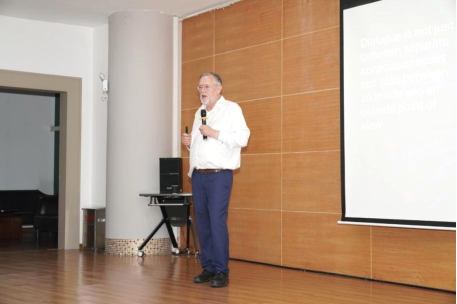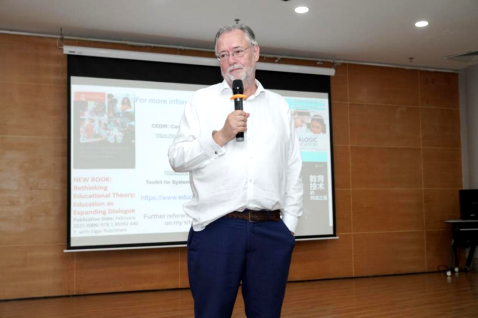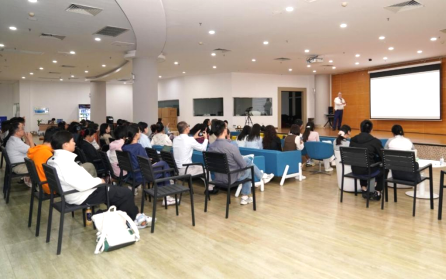On November 18th, the 24th session of the Future Education International Salon series was successfully held as scheduled. Professor Rupert Wegerif from the Faculty of Education at the University of Cambridge delivered an academic lecture titled "Education as Expanding Dialogic Space."

Starting with the fundamental question, "What is the goal of education?" Professor Wegerif argued that the core aim of education should be to cultivate dialogic skills, enabling deep learning through dialogue and fostering the comprehensive development of creative thinking, critical thinking, and teamwork skills through learning to dialogue.
Professor Wegerif then elaborated on the essence of dialogue: an exchange between multiple perspectives, exploring truth in an open and collaborative manner, rather than a unidirectional authoritative transfer or simple exchange of information. Through an analysis of the "2010 Deepwater Horizon oil spill in Mexico" case, he emphasized the importance of dialogue and teamwork in addressing global challenges. He pointed out that effective dialogue involves a series of key elements, such as active participation by all, sharing of relevant information, constructive criticism and interaction, providing reasons and explanations, and continuously building upon responses.
In the face of complex challenges such as artificial intelligence, global pandemics, and climate change, Professor Wegerif highlighted the need for future societies to cultivate citizens with collective intelligence. Dialogic education, he emphasized, is a critical pathway to achieving this goal.

Finally, Professor Wegerif explored the integration of artificial intelligence with dialogic education. He argued that AI can not only provide rich contextual information for education but also inspire students to ask questions and think critically, fostering the creation of two-way dialogues. He envisioned an AI-based dual-dialogue educational model: on one hand, cultivating students' thinking skills through dialogue, and on the other, guiding them to become active participants in future society through cultural dialogue.

After Professor Wegerif concluded his lecture, both onsite and online participants actively engaged in the discussion, raising numerous profound questions. When addressing the topic of "how to cultivate children's ability to engage in critical dialogue with humans and AI in the AI era," Professor Wegerif emphasized that education should focus on developing students' capacity to question and challenge AI-generated answers. He argued that when interacting with AI, students should not merely be passive recipients of information but should actively express their own perspectives and demonstrate critical thinking. This ability, he noted, is not only essential for human-AI dialogue but also one of the core goals of education in the AI era.
Regarding how to encourage students to participate more actively in classroom discussions, Professor Wegerif suggested fostering engagement through group discussions that prompt students with questions such as: "What do you think about this?" and "Why do you believe that?" This approach aims to stimulate intellectual exchanges among students. He stressed that creating a positive dialogic atmosphere is crucial, which requires being tolerant of students' mistakes and encouraging them to take risks and experiment. This would make students more willing to participate in discussions and share their thoughts.
Additionally, Professor Wegerif proposed an innovative teaching strategy: leveraging AI to simulate complex or challenging dialogue scenarios, enabling students to practice and enhance their skills through hands-on experience and gradually apply what they have learned to real-world situations.
In response to the question, "Socratic dialogue embodies strong personal charisma, involving not only cognitive exchanges but also emotional interactions. How can current AI inspire high-quality dialogue?" Professor Wegerif noted that modern AI has demonstrated potential in providing emotional support, such as fostering a supportive, encouraging, and helpful conversational environment while avoiding language that could be perceived as threatening, judgmental, or overly critical by students. He advocated for fully utilizing these AI characteristics to create a more open and less pressured dialogic space for learners.
The salon concluded successfully in an atmosphere of critical thinking and meaningful exchange. Attendees expressed that the lecture not only inspired a renewed reflection on the essence of education and deepened their understanding of dialogic education but also offered fresh perspectives and insights into the deeper integration of education and AI technologies for the future.



 Last Page
Last Page
 Phone:0756-3621121
Phone:0756-3621121
 Email:ccie@bnu.edu.cn
Email:ccie@bnu.edu.cn